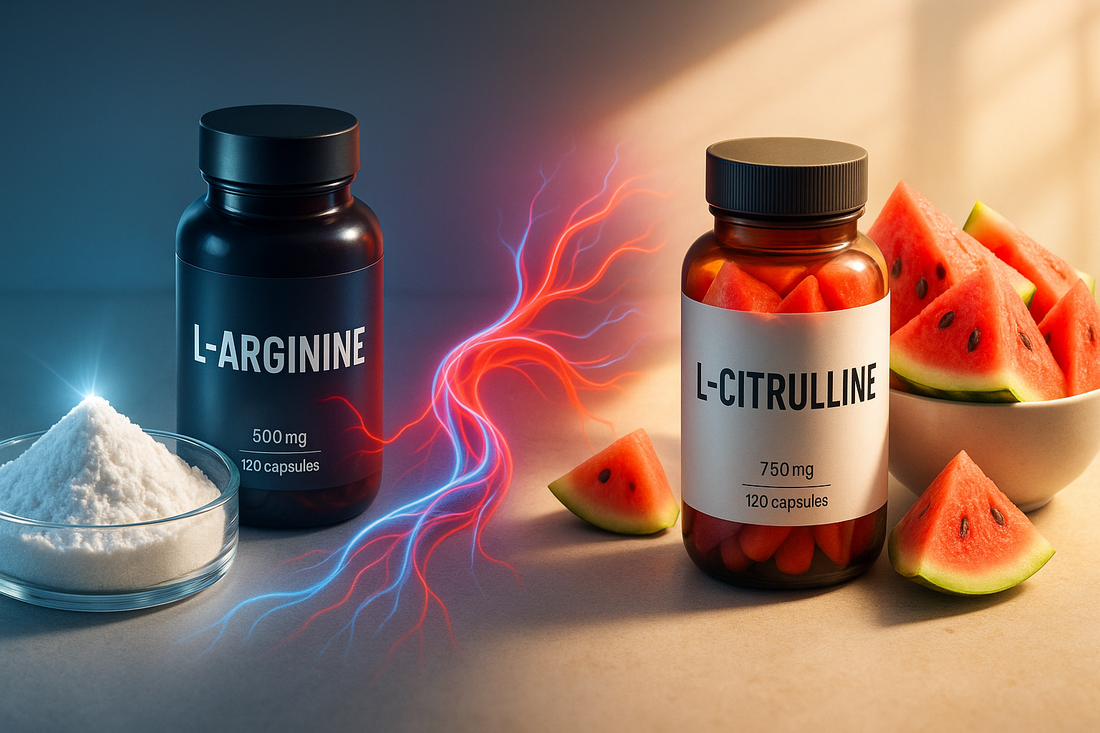
L-Citrulline vs. L-Arginine: Which Is Better for Energy?
Share
In the quest for greater energy, stamina, and athletic performance, two amino acids frequently top the conversation: L-citrulline and L-arginine. Both are respected for their role in supporting nitric oxide (NO) production and improving blood flow, yet they operate differently in the body, leading to unique advantages for anyone seeking a natural energy boost. But which one truly comes out on top when it comes to enhancing energy, endurance, and exercise performance? Let’s dive deep into the science, practical applications, and ultimate benefits of each, so you can make an informed choice for your health and wellness journey.
The Basics: What Are L-Citrulline and L-Arginine?
- L-Arginine is a conditionally essential amino acid, found in many protein-rich foods and produced by the body. It serves as the direct substrate for nitric oxide synthase enzymes, allowing the body to create NO crucial for relaxing blood vessels, improving circulation, and oxygenating tissues.
- L-Citrulline is a non-essential amino acid found in watermelon and produced in the body during the urea cycle. Uniquely, L-citrulline acts as a precursor to L-arginine, boosting arginine levels indirectly after being converted in the kidneys.
Both are key players in the NO pathway, which is central to cardiovascular health, energy supply, and muscular performance.
How Do They Work? Pathways and Science
L-Arginine
- Direct NO Precursor: L-arginine is converted directly into NO, quickly relaxing blood vessels and improving flow.
- Short Half-Life: Orally supplemented L-arginine is heavily metabolized by the enzyme arginase in the gut and liver, meaning much of it never reaches the bloodstream intact.
- Immediate Effects: Rapid utilization leads to a relatively short-lived peak in blood arginine and NO levels.
L-Citrulline
- Indirect, Sustained Support: L-citrulline bypasses first-pass metabolism, travels easily to the kidneys, and is then converted into L-arginine. This process steadily raises arginine and, thus, NO levels.
- Longer-Lasting: Supplementation results in a more sustained and higher increase in blood arginine and NO compared to direct L-arginine supplementation.
- Superior Bioavailability: As a result, L-citrulline is often considered more efficient for boosting NO and supporting vascular health.
Head-to-Head for Energy and Endurance
Energy During Exercise
- Both L-arginine and L-citrulline enhance blood flow, supporting the delivery of oxygen and nutrients to active muscles.
- L-citrulline’s more sustained effect means users experience longer periods of improved circulation and energy during prolonged activity.
- By sparing and recycling arginine, L-citrulline helps delay the onset of fatigue and muscle "burn," allowing for more reps, longer workouts, and faster recovery.
Endurance and Power
-
Clinical research increasingly favors L-citrulline for endurance and exercise capacity. Studies have shown:
-
L-citrulline supplementation improves time-to-exhaustion, reduces perceived exertion, and enhances aerobic performance.
-
L-arginine can be effective, but inconsistent absorption and rapid metabolism limit its efficacy, especially in older individuals or those with metabolic stress.
-
Blood Pressure and Circulation
- Both increase nitric oxide, which helps lower blood pressure and enhances overall circulation crucial not just for athletes, but anyone looking to combat fatigue and mental fog.
- L-citrulline lowers blood pressure more reliably, especially when taken regularly.
Recovery and Muscle Soreness
- By aiding NO production and facilitating waste removal (like ammonia and lactate), L-citrulline has been shown to reduce muscle soreness after exercise.
- L-arginine supports muscle repair too, but not as powerfully or for as long.
Additional Wellness Benefits
- L-Arginine: Valuable for acute energy needs, immune support, and sexual health due to direct vasodilation.
- L-Citrulline: Ideal for chronic cardiovascular support, men’s and women’s wellness, and age-related circulation concerns.
Safety and Tolerability
- Both amino acids are considered safe at recommended doses, but L-citrulline is often better tolerated, with fewer digestive complaints than high-dose L-arginine.
- L-arginine supplements may cause GI discomfort or bloating in sensitive people.
Practical Supplementation Strategies
For rapid, immediate burst of energy (pre-workout, acute fatigue):
-
L-Arginine may offer temporary benefit—but effects often fade quickly.
For longer-lasting energy, stamina, and recovery:
-
L-Citrulline wins for ongoing exercise, daily wellness routines, and enhanced endurance.
Best of Both? Some high-performance supplements combine both, leveraging L-citrulline’s sustained elevation of NO with L-arginine’s immediate boost for a phased, balanced energy effect.
Who Should Choose Which?
- Choose L-Arginine If: You want a short-term circulation or energy boost, are targeting acute episodes (like sexual performance), or respond well to low doses.
- Choose L-Citrulline If: You’re seeking improved workout endurance, faster recovery, reliable energy throughout the day, general cardiovascular support, or a supplement that’s gentle on digestion.
Conclusion: L-Citrulline Leads for Lasting Energy
While both L-arginine and L-citrulline support nitric oxide production and improved energy, L-citrulline stands out for its superior absorption, longer-lasting effects, and higher reliability in boosting circulation and endurance. For athletes, fitness enthusiasts, or anyone battling daily fatigue, L-citrulline is usually the better choice for sustained energy and wellness.
Ultimately, understanding your own goals immediate surge or all-day stamina will help you select the right amino acid, or an effective combination, for your unique energy needs.





